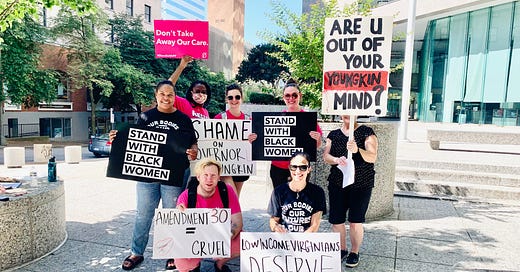Virginia activists turn focus to winning state races to advance abortion rights
The state’s legislature must read the proposed amendment for two consecutive terms to get a ballot initiative before voters.
As the last election’s successes and failures sink in, the abortion rights movement’s leaders now must shift their attention to what’s next.
One particular focus is the legislative elections in Virginia in November 2025. The state is unique because its general assembly is elected in odd years when federal elections aren’t held. Due to laws, it can’t get a ballot initiative to protect abortion rights before voters unless there has been a reading of the proposed amendment within its state house after two consecutive elections. I spoke with Lucy Hartman, political manager for Virginia’s List, which works to get Democrats elected there.
“I don't think most people are even tuned into the fact that that has to happen, let alone the fact that we have to have multiple votes on it,” Hartman said. “It's not just one and done. We have to have elections sandwiched in between.
“So I would say we should increase the sense of urgency around educating people and then also tie that to who's running this year, especially in competitive races.”
Thus far, there has been one reading. If they can get enough seats in the next election, they can do the second one and then get the initiative before voters in 2026.
Abortion is legal in Virginia for up to 26 weeks and then permissible after to save the life of the mother if three doctors determine it’s at risk. Parental notification is required for people under the age of 18.
The proposed amendment provoked some controversy because it changed the required number of doctors who would have to approve abortions later in pregnancy from three to one. The existing requirement resulted from the passage of TRAP laws, which stands for targeted regulation of abortion providers. That type of legislation had been common before the Dobbs decision as a way to hamper abortion clinics by making them too cumbersome to operate, thus driving them out of business.
“That has always been controversial,” Hartman said. “That's nothing new. I think the anti-folks would deem having only one doctor to be controversial.”
Next year will also be important because Republican Winsome Earl Sears, who is antiabortion, will run against Abigail Spanberger, a pro-choice politician who is fairly popular in the state. Currently, Republican Glenn Youngkin holds the governor’s mansion.
Hartman said she expects opposition from the usual groups, including the Catholic Church, which had its bishops in the state condemn the proposed amendment. She also thinks Students for Life, which operates on college campuses, will also play a role in the effort to prevent its passage.
“Where people are not really expecting opposition to come is going to be on college campuses,” Hartman said. “And those folks don't necessarily have the same amount of power or don't control the levers of government. But it's definitely newsworthy.”
While the presidential race hurt Democrats in places like Florida and Nebraska, a second administration from the polarizing Donald Trump will likely galvanize voters to flip state legislatures and Congress in two years. Whatever the national mood, it’s important to focus on continuing the movement's success with these ballot initiatives.




